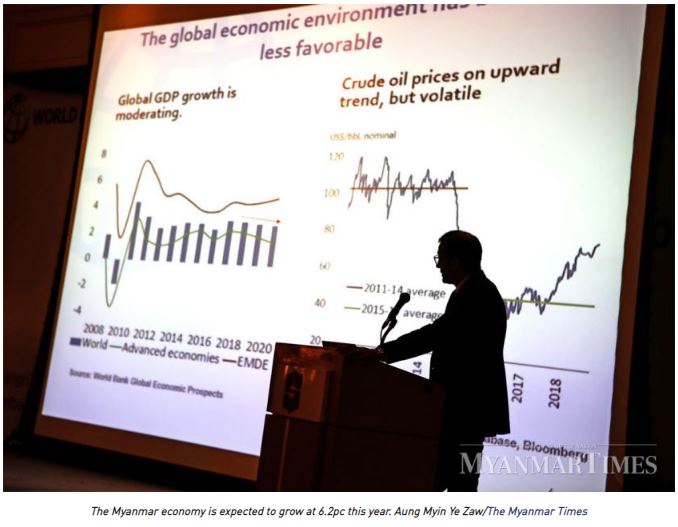World Bank downgrades Myanmar’s GDP forecast, flags rising risks
Myanmar is forecast to grow at a slower pace of 6.2 percent this year compared with 6.8pc in the previous year, according to a report by the World Bank released yesterday.
While prospects for the economy are positive over the longer term, the risks to growth for the coming year have also risen. In that light, it is crucial for the authorities to execute planned reforms and sustain recent improvements made in luring new investments, the report says.
U Wai Phyo, managing director of Yathar Cho Industry, said the World Bank’s 6.2pc growth forecast “is not satisfactory for a market like Myanmar. We are not seeing sufficient variety of businesses to sustain further growth in the economy. The market is currently too small. The government needs to have a better grasp of the micro and macroeconomic situation to foster more growth,” he said during a panel discussion during the launch of the December 2018 Myanmar Economic Monitor report.
The humanitarian crisis in Rakhine remains among the top reasons for slower growth. The tourism sector, in particular has borne the brunt of the crisis, with growth in tourist arrivals dropping to 0.7pc for the first nine of months of the year compared with 7.1pc last year. Tourists from non-Asian regions have fallen between 15pc and 25pc from January to September this year, more than offsetting arrivals from Asia, which rose 10pc over the period.
The numbers reflect reports of booking and tour cancellations by western tourists in late 2017, after news of violence in Rakhine was reported on a global scale, The World Bank said. Tourism accounts for 2.7pc of the country’s GDP
The crisis in Rakhine has also prompted the European Union to consider revoking trade benefits awarded to Myanmar exporters under the Generalised System of Preferences (GSP). Myanmar’s garment manufacturing industry will be particularly hard hit if the GSP is withdrawn, given that close to 50pc of the country’s garment exports are bound for Europe.
Kyat depreciation
After falling 18pc against the US dollar since April, the Myanmar kyat has stabilised at around K1550 per US dollar recently. But expect volatile exchange rates to continue next year, warned Hans Anand Beck, World Bank lead economist for Myanmar.
Further kyat depreciation is likely on the back of rising trade uncertainty and a slowing global economy, which is projected to grow at 2.9pc next year compared to 3pc this year. The lower value of the kyat will make imports of construction materials and fuel costlier for local businesses at a time when global oil prices are also getting more volatile, Mr Beck said.
He added that inflation is expected to accelerate from 5.5pc last year to 8.8pc this year, driven by the exchange rate.
As a result, both the industrial and manufacturing sectors, which rely heavily on input imports, are expected to taper. Meanwhile, a larger number of small and medium enterprises (SMEs) have reported a fall in production, orders and sales.
Furthermore, foreign investors are committing less capital towards business expansion in Myanmar. New foreign direct investment (FDI) commitments have halved during the first six months of this year compared to the same period last year, “indicating that FDI flows may start declining this year,” according to the World Bank.
“Investors believe that the recent slowdown in commitments may reflect uncertainty in the investment climate related to the Rakhine crisis and weak reform momentum,” the report said.
Reforms crucial
Yet, Myanmar can still grow if the reforms it has planned are executed properly. The Myanmar Sustainable Development Plan, which aims to connect and align the country’s numerous policies and institutions for the purpose of generating economic growth, is among the most anticipated policy reforms in place. This month, a Project Bank of Public Investment Programmes to facilitate major project proposals from the states and regions in the Union was established under the plan.
Other promising developments include the liberalisation of the retail and wholesale sector, enforcement of the Myanmar Companies Law and upcoming establishment of a credit bureau in the country, Mr Beck said.
Other policies, such as the reducing the government’s borrowing from the Central Bank to plug the fiscal deficit, are also progressing as planned. Last year, fiscal financing by the Central Bank dropped by a third compared to the year before, as more funds were channelled towards deepening the country’s fledgling bond market.
“We see the government is making progress in accelerating policy reform. But businesses are still facing practical difficulties in carrying out operations. Beyond changing the rules and regulations, the government should also focus on introducing practical solutions that enable firms to conduct business more easily,” Daw Thiri Thant Mon, country representative of CDC Group, said during a panel discussion after the release of the report.
Source: https://www.mmtimes.com/news/world-bank-downgrades-myanmars-gdp-forecast-flags-rising-risks.html


 English
English




